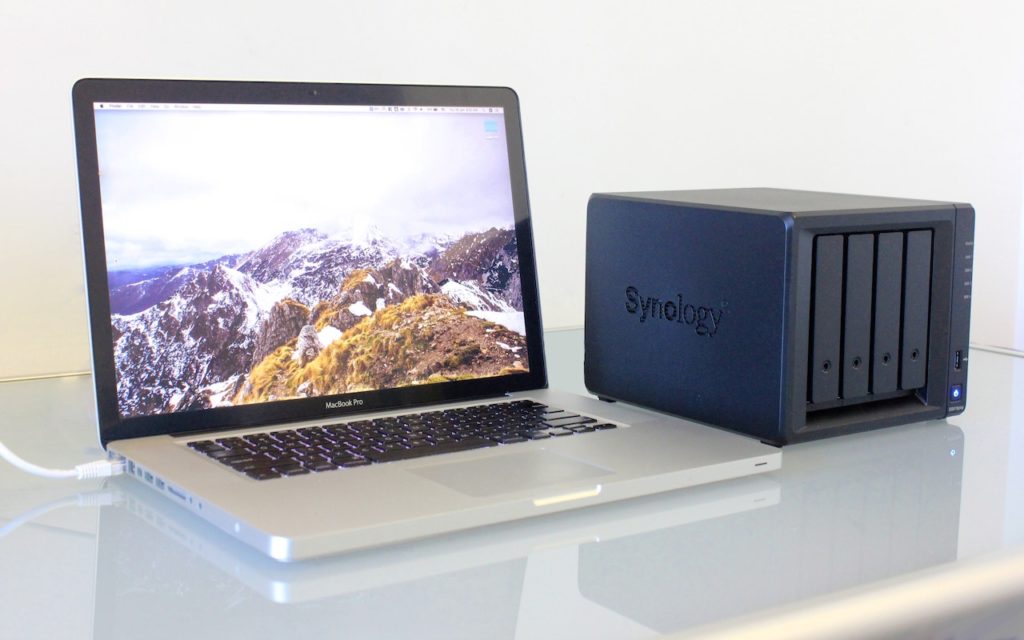

If you’ve filled up your external hard drives or become frustrated by their limitations, it’s time to look into a network-attached storage (NAS) device. What’s a NAS? It’s an intelligent storage device that can accept one or more hard drives or SSDs and connects to your network via Ethernet.
NAS Benefits
A NAS is a good choice for anyone who needs access to lots of storage, but small businesses will particularly appreciate the benefits of a NAS. They include:
- More storage: Most NAS devices provide multiple drive bays, so you can pop in a few large hard drives or even attach expansion units for a vast amount of available storage.
- Expandable storage: A NAS is perfect if you anticipate your storage needs growing over time. You could start with 3 TB drives today and swap them out for 6 TB drives in a year or two.
- Data protection: Drives fail, but some NAS devices can ensure that you don’t lose data if that happens by combining multiple drives into RAID arrays.
- Network backups: Because a NAS is always available on your network and provides lots of storage, it can work well for on-site backups.
- Laptop access: It’s fussy for mobile users to attach external hard drives to laptop Macs. An always-available NAS eliminates that annoyance.
- Remote access and cloud storage: You can usually configure your NAS so it’s available over the Internet from outside your network. That means it can work like a private version of Dropbox that’s entirely within your control and has no monthly fees.
- Streaming media: Home users with massive movie libraries can take advantage of NAS features that make it easy to stream video to computers, TVs, tablets, and smartphones.
NAS Features
Quite a few manufacturers make NAS devices, including Synology, QNAP, Drobo, and WD, and prices vary widely depending on the feature set. Things to consider include:
- Number of drive bays: The most important decision to make when choosing a NAS is the number of drive bays. It may be tempting to start with a less-expensive two-bay model, but particularly if you want to use RAID to protect your data, that limits your storage significantly.
- RAID support: RAID works well for preventing data loss if a drive dies. RAID 1 constantly mirrors the data from one drive to another so if one fails, all the data is on the other. RAID 5 uses data striping techniques with at least three drives to preserve data even if one drive fails. Proprietary technologies may be more flexible in terms of the number and size of the required drives. Synology’s RAID Calculator is helpful for figuring out how much space you get with different collections of drives.
- Ethernet speed and ports: Most NAS devices have Gigabit Ethernet, but you can pay more to get 10 Gigabit Ethernet. That’s helpful only if you have an iMac Pro or a Thunderbolt 3 adapter. Also, some NAS devices have a feature called link aggregation that uses multiple Ethernet ports and an LACP-enabled Ethernet switch to balance traffic across ports for higher performance in multi-user setups.
- Hardware encryption: For additional security, some NAS devices offer hardware encryption. It requires more CPU power but ensures that a stolen NAS won’t reveal your data.
- Hardware transcoding: Those who host media libraries on a NAS may find this feature useful. It automatically converts high-resolution video files to versions that are optimized for the destination—there’s no reason to send 4K video to a 1080p TV.
- CPU and RAM: Since a NAS is a full-fledged computer, it has a CPU and needs RAM to accomplish its tasks. If all you’re doing is serving files, the CPU doesn’t matter much, but for hardware encryption and transcoding, a faster CPU will be helpful. Similarly, those functions, or support for lots of users, may benefit from more RAM, so look for a NAS whose RAM is expandable.
- Physical factors: Since a NAS runs all the time, pay attention to how much power it draws and how much noise it makes. In general, the less of each, the better.
Use NAS-specific Drives
One final piece of advice. It’s tempting to use old drives you have around, but doing so may be problematic for a few reasons:
- Combining drives of different capacities can result in unusable disk space in some RAID configurations.
- The likelihood of failure is higher with older drives, and even if a RAID prevents data loss, dealing with a dead drive is still stressful.
- NAS-specific drives, as opposed to garden-variety drives, sport features designed to minimize data corruption, minimize vibration, and adjust rotation speeds for longer life.
Instead, look for NAS-specific drives, such as those in the WD Red and Seagate IronWolf lines.
Honestly, while a NAS is a great investment and effective addition to your technical infrastructure, picking the right one is a complex decision. If you need help, get in touch with us to see what we recommend for your specific situation.
(Featured image by Alex Cheung on Unsplash)
